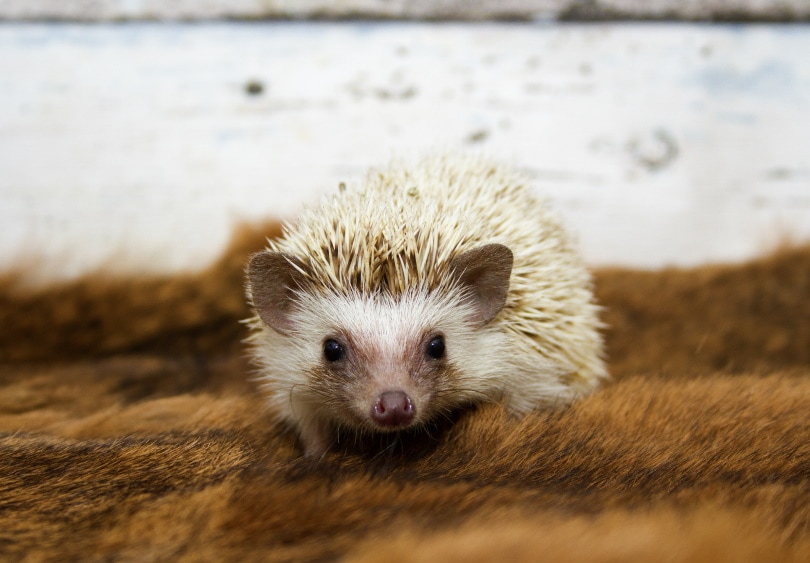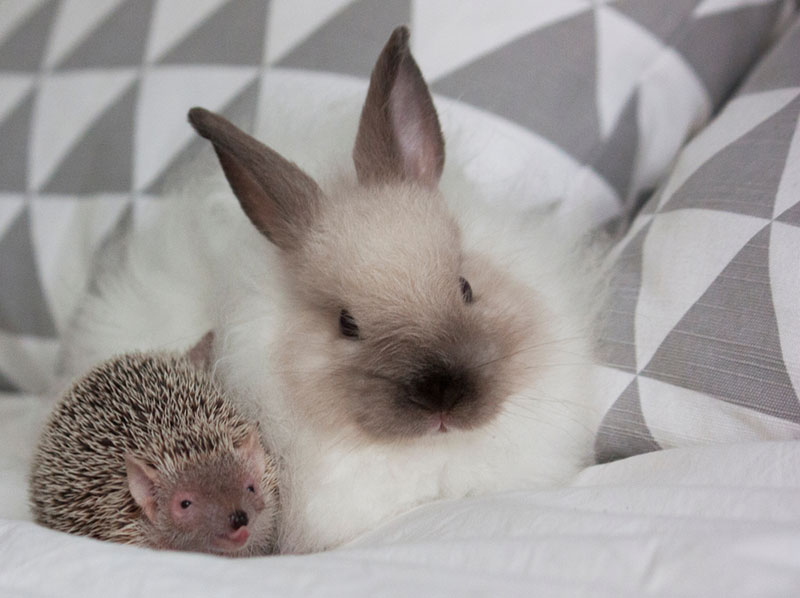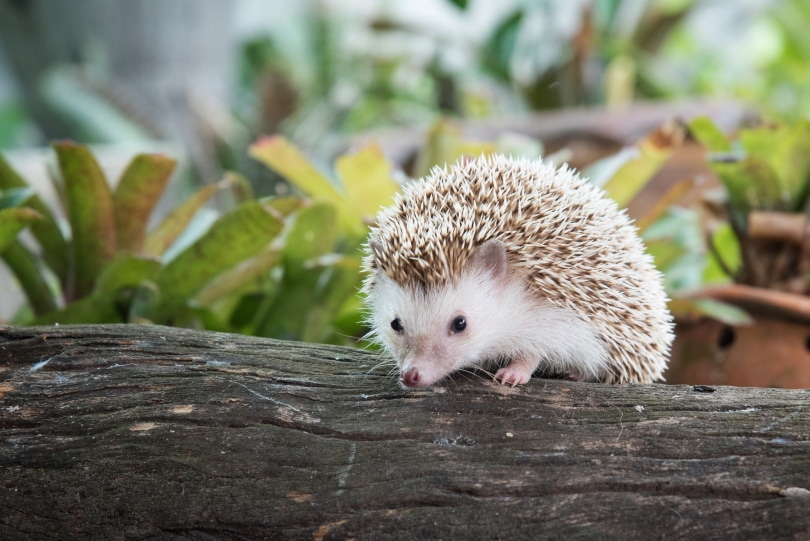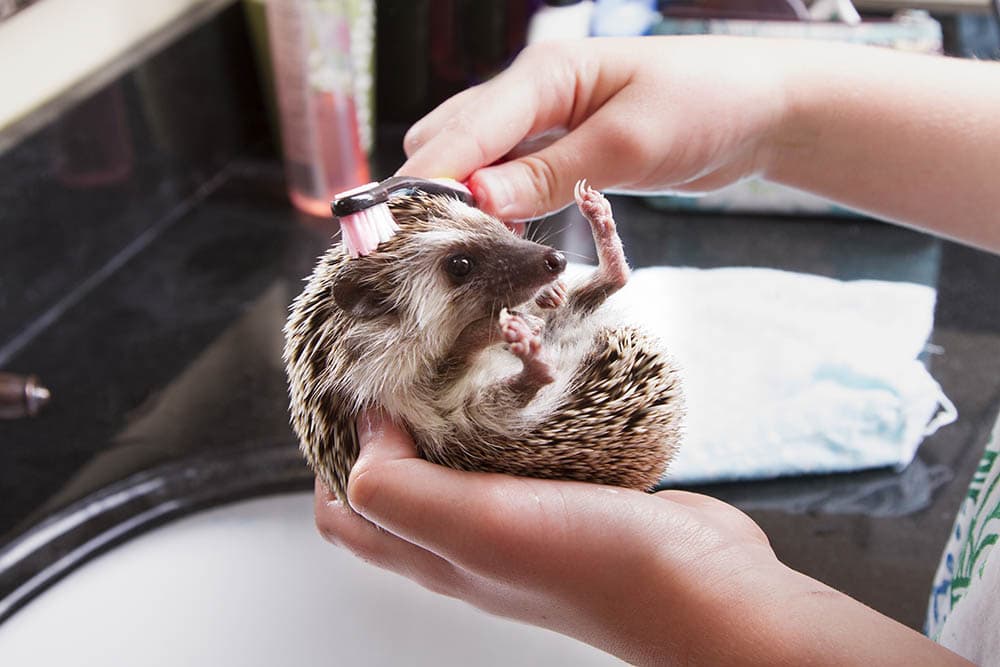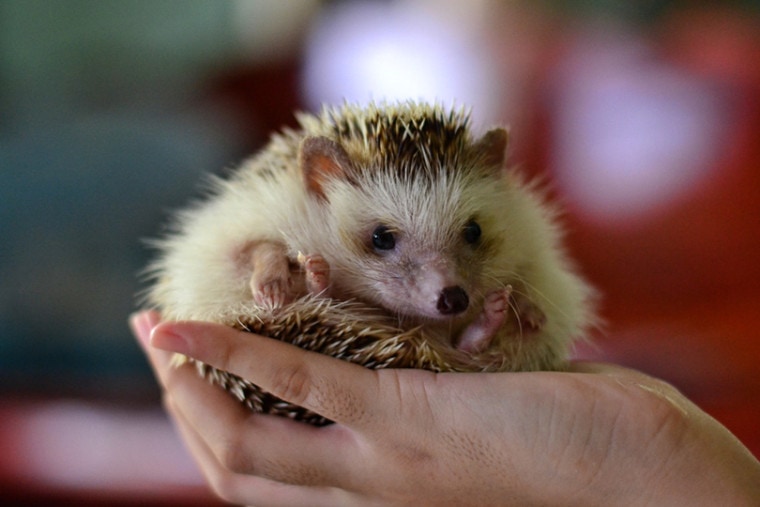
With faces as adorable as their quills are sharp, African pygmy hedgehogs make a truly unique exotic pet option. While they aren’t the most difficult exotic pets out there to care for, African pygmy hedgehogs won’t be the best choice for every owner either. Keep reading to learn all about these cute creatures, what it takes to care for them and how to decide if they’re the right pet for you!
Quick Facts About African Pygmy Hedgehogs
| Species Name: | Atelerix albiventris |
| Family: | Erinaceidae |
| Care Level: | Moderate |
| Temperature: | 75 – 85 degrees Fahrenheit |
| Temperament: | Shy and solitary |
| Color Form: | Salt and pepper are most common, other different colors are possible |
| Lifespan: | 4 – 8 years in captivity |
| Size: | 6 – 8 inches long |
| Diet: | Pellets, insects, worms, fruits, and vegetables |
| Minimum Cage Size: | 24 inches x 36 inches minimum |
| Cage Set-Up: | Paper bedding, food, and water bowls, exercise wheel, heat source, hiding spot |
| Compatibility: | Best kept alone, occasionally females can be kept together |
African Pygmy Hedgehog Overview
Also called four-toed hedgehogs, the African pygmy hedgehog is native to much of Central, Western, and Eastern Africa. These tough and adaptable little creatures can live almost anywhere so long as it’s not too wet and they can find a dry shelter and plenty of bugs to eat. They’ve even figured out how to live in suburban areas of Africa, where they are useful in controlling insect pests.
African pygmy hedgehogs have about 6,000 quills covering their bodies. When threatened, the hedgehog curls into a ball, pointing these hard, sharp quills outward for protection. Only the strongest of their predators–badgers– can pry open a balled-up hedgehog.
When temperatures in their native lands reach their hottest, hedgehogs will go into the hot weather equivalent of hibernation, called aestivating.
Hedgehogs held various roles in human life as far back as the time of the Roman Empire, including serving as pets, food, and inspiration for art, jewelry, and literature.
In America, pygmy hedgehogs first entered the pet trade during the 1990s, where they quickly became sought-after fad pets. Their popularity faded in the mid-1990s when hedgehog imports were banned because the small creatures are carriers of Foot and Mouth disease, a major danger to livestock.
Today, African pygmy hedgehogs are growing in popularity again, as are many exotic pets. While they can be legally imported with a permit from countries free of Foot and Mouth disease, they are not legal to own in every state. Before you buy an African pygmy hedgehog, make sure they are allowed in your city or state.
How Much Do African Pygmy Hedgehogs Cost?

Most African pygmy hedgehogs cost $100-$300, sometimes more if they are of a rare or unusual color. Young, hand-reared baby hedgehogs could also cost more to purchase. Hedgehogs are rarely available at large, chain pet stores but can often be found at specialty exotic pet shops or from reputable breeders.
It’s also possible that you can find a hedgehog available for adoption, either at your local shelter or through an exotic animal rescue group. Adoption costs will vary but are usually less than the cost of buying a hedgehog.
Typical Hedgehog Behavior & Temperament
In the wild, African pygmy hedgehogs live on their own except during breeding season. They are shy and solitary animals who spook easily, curling into a defensive ball. Hedgehogs also bite if startled, so it’s important to go slowly and socialize them, preferably from a young age.
African pygmy hedgehogs are nocturnal animals and are quite active at night. With patience and daily socialization, most hedgehogs learn to tolerate handling without stress and can be very interactive with their owners.
African Pygmy Hedgehog Appearance & Varieties
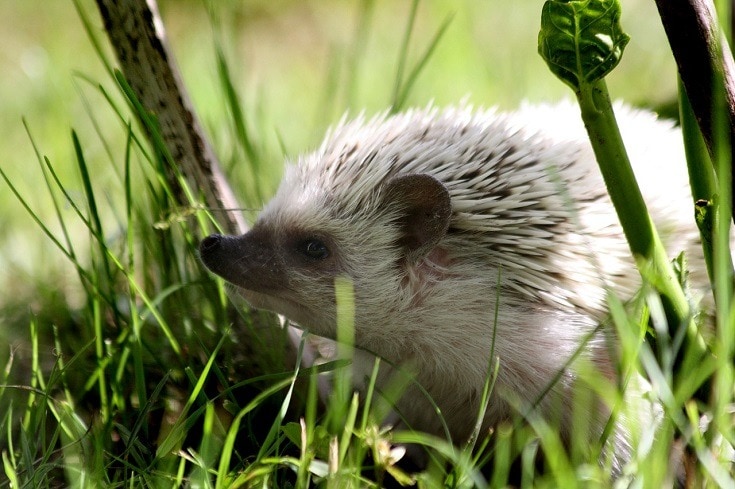
All African pygmy hedgehogs have the same basic round body, soft belly, and back full of quills. Their faces are adorably pointed, with small round ears. They have long snouts, suitable for poking into tight spaces hunting insects.
The most common color type of African pygmy hedgehogs is salt and pepper. These hedgehogs have white quills with black bands and white bellies. Besides this color, there are many other possible color types found in African pygmy hedgehogs.
Hedgehogs can have different colored noses, eyes, and bellies as well as bands on their quills. A few varieties have larger masks on their face as well. Some of the other common colors you may see are cinnamon, snowflake, champagne, and platinum.
Like we mentioned earlier, you may pay more for a hedgehog who isn’t the classic salt and pepper color.
How to Take Care of African Pygmy Hedgehog
Habitat, Cage Conditions & Setup
Hedgehog Cage
The African pygmy hedgehog should be kept in a cage no smaller than 24 inches x 36 inches. Hedgehogs are excellent climbers and small enough to be escape artists, so an enclosure with smooth sides is ideal. If you use a wire cage, make sure the bottom is smooth, so their toes don’t get stuck.
Newspaper or other paper bedding is the best option for an African pygmy hedgehog. Wood shavings or cat litter aren’t safe because the hedgehog may eat them and get an intestinal blockage.
The cage should also contain untippable food and water bowls or a water bottle attached to the cage. Hedgehogs need a hiding box to sleep during the day as well.
Hedgehog Cage Temperature
African pygmy hedgehogs are used to hot desert conditions and won’t tolerate colder temperatures. Their cage should be kept between 75-85 degrees Fahrenheit. A heating pad or heat lamp are good options and a cage thermometer can help you make sure the temperature stays in the correct range.
Hedgehog Cage Lighting
Hedgehogs need a consistent lighting schedule of about 12-14 hours per day. Since they are nocturnal, they will need periods of darkness as well. They don’t necessarily need a special cage light so long as they are kept in a room with a light source.
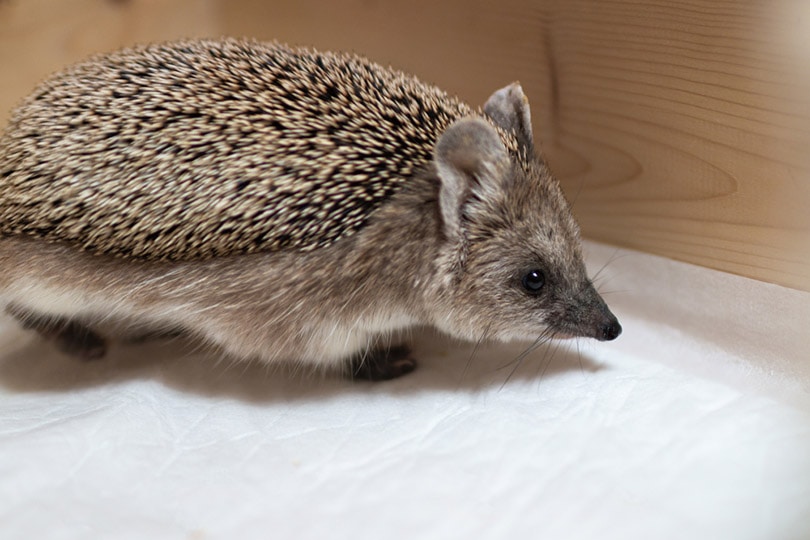
Exercise And Enrichment
African pygmy hedgehogs are active creatures who are also prone to obesity. Because of this, all hedgehogs should have plenty of opportunities for daily exercise. Keep a solid (not wire) exercise wheel in your hedgehog’s cage. They should also be given time out of their cage each day in a safe location to run and explore.
Another way to keep your hedgehog active and entertained is to provide ramps, pipes, or other items for them to climb and play on in their cage. Hedgehogs may also enjoy playing with bird chew toys or cat ball or bell toys.
Hedgehog Cage Cleaning
Hedgehog cages should be spot cleaned every day to remove old food and feces. Replace all bedding with a fresh supply weekly. Hedgehogs should also receive fresh food and water every day.
Do African Pygmy Hedgehogs Get Along with Other Pets?

As we already mentioned, African pygmy hedgehogs are by nature loners and do best if kept by themselves. Some female hedgehogs will accept another female friend. Males and females should only spend time together for breeding purposes.
If you want to keep two female hedgehogs together, make sure they have a big enough cage that they won’t need to compete for sleeping or eating space. Also introduce them slowly, first by keeping separate cages side by side then progressing to allowing them to spend time together outside the cage.
Once you feel comfortable enough to try the ladies in a cage together, supervise them closely for several days and be prepared to separate them if any problems arise.
Hedgehogs will sometimes co-exist or even make friends with other small rodents outside their cages. They may even learn to get along with dogs and cats, depending on the temperament of the larger animals. Hedgehogs should never be allowed to interact with predator animals unsupervised. Never house a hedgehog with any other small rodent.
What to Feed Your African Pygmy Hedgehog
Wild African pygmy hedgehogs feed on a variety of foods, including insects, snails, fish, mushrooms, roots, and berries. It can be a little bit tricky to provide a pet hedgehog with a similar diet to their wild relatives, given how varied it is.
Pet African pygmy hedgehogs should eat mostly a pellet diet formulated for hedgehogs or insectivores. They can also be offered small numbers of worms and insects and limited amounts of fruits and vegetables. Here are some safe fruits and vegetables for hedgehogs:
Although pygmy hedgehogs love hunting live insects, you should limit the amount you offer or they may eat only bugs, leading to an imbalanced diet and an overweight hedgehog.
Keeping Your African Pygmy Hedgehog Healthy

To get started with the healthiest hedgehog possible, make sure to purchase or adopt from a reputable source. Find an exotics veterinarian familiar with hedgehog care before you bring your new pet home and take the African pygmy for a check-up as soon as you can.
Keep your hedgehog’s cage clean and make sure they get plenty of exercise and the right diet. Obesity is extremely common in hedgehogs, often because they are fed too many insects. Here are some other common health problems you may see in a hedgehog:
Healthy hedgehogs should see the vet yearly for a checkup and fecal parasite screening. You should also contact your vet if you notice any concerning symptoms or are worried your hedgehog is not feeling well.
African Pygmy Hedgehog Breeding
African pygmy hedgehogs are physically able to breed any time of the year, on a rotating heat cycle. Females should not be bred until they are about 6 months old to ensure they’re finished growing, but no later than 12 months old.
Breeding pairs should be healthy, vet-checked, and have good temperaments. When you’re ready to attempt breeding, place the male and female together in a cage for some time (3-10 days typically) to see if they seem responsive to each other, monitoring for any fighting or aggression.
If the female becomes pregnant, she will carry the babies for 35-40 days. Once the babies are born, the mother and babies should not be disturbed for at least 10 days to allow them to bond. Female hedgehogs, especially first-time mothers, are prone to abandon or kill their babies, especially if they are disturbed or stressed. Minimizing stress during pregnancy and nursing is extremely important.
Babies are usually weaned around 6 weeks. Early handling and socialization will make the baby hedgehogs better pets.
European Hedgehog vs African Pygmy Hedgehog

While African hedgehogs are the most common pet hedgehogs, other species do exist, including the European hedgehog. So, what are the differences between these two animals?
European hedgehogs are native to Europe, not Africa. They are bigger than African hedgehogs, about 10 inches long usually.
European hedgehogs are always brown, unlike the multitude of color variations found in captive-bred African hedgehogs. The European species is adapted to colder weather as well and will hibernate in winter.
While African pygmy hedgehogs maintain stable wild populations and are not a species of concern, European hedgehogs are threatened in many parts of their range, especially the United Kingdom. Because of this, they cannot be kept as pets like African pygmy hedgehogs.
Are African Pygmy Hedgehogs Suitable For You?
Now that you know what it takes to care for an African pygmy hedgehog, you probably have a good idea whether they’re the right pet for you. The most important point to consider is whether you have the time to properly care for one of these animals.
African pygmy hedgehogs don’t require complicated care but do need daily attention. Not only daily cleaning is required but also time spent handling and socializing your hedgehog. And remember, hedgehogs are nocturnal. You’ll probably only get a short window of awake time from them before you head to bed yourself!
Conclusion
With patience and proper handling, African pygmy hedgehogs can make wonderful, one-of-a-kind pets. Before bringing home any pet, you should learn all you can about them and how to keep them safe and healthy. Exotic animals like hedgehogs present their unique challenges but owning any pet is a huge responsibility and one that shouldn’t be taken lightly.
Featured Image Credit: Spela RJ22, Shutterstock


